Gina Holmes's Blog, page 3
August 30, 2017
Creating a Swoon-worthy Leading Man
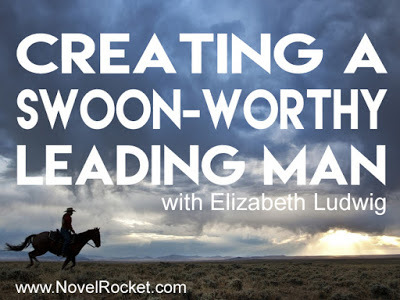 by Elizabeth Ludwig, @ELudwig_Author
by Elizabeth Ludwig, @ELudwig_AuthorI was in Michigan recently attending the graduation ceremony of a much beloved nephew. While there, I got to see one of nature’s most amazing miracles…the hatching of a robin’s egg. Those little critters sure are ugly when they’re born! Still, there’s something magical about witnessing the struggle and determination this tiny life displays as it pecks and pokes and pries its way free of its shell. Unfortunately, not everyone was happy about my standing by while it happened.
I tried to be respectful of Momma Bird as I peeked around the corner of my parents’ garage for a glimpse of the new hatchlings. I even used my strongest zoom lens so I didn’t have to get too close to the nest. Still, Daddy Bird was rather violently opposed to the attention I was giving to his little family. At first, he just chirped and squawked to let me know he wanted me to mosey on my way. When that didn’t work, he flew down off his high branch in the trees and landed several feet away. Then he hopped a few feet closer…then a few more feet. Finally, this three-inch robin stood mere feet away, his beady little eyes fixed on me as though sizing me up for a fight.
This struck me as kind of funny at first. After all, this was a robin. He probably only weighs a couple of ounces, yet this feisty little hero stuck out his chest and raised his voice until he caught my attention. Then, in a show of bravado, he flapped his wings at me, and rather aggressively, I might add. With visions of Alfred Hitchcock’s movie in my head, I quickly snapped my picture and moved away!
Now, all of this got me to thinking. What was it about this brave little bird that I could apply to my literary heroes?
First, I admired his courage. Despite the odds, he was willing to plunge headlong into a fight he knew he could not win. Second, with no concern for his own well-being, this tiny hero stepped between me and his family, and when that didn’t work, he provided the diversion his mate needed to fly to safety. And finally, it was his persistence, his dogged determination to stay with the battle that impressed me the most. All of these things made for a character, albeit tiny, that I could root for, and even admire.
I have to think that applying the same traits to the leading men in my novels would also make them exciting, admirable, and without a doubt, swoon-worthy. What do you think?
TWEETABLES
Creating a Swoon-worthy Leading Man by @ELudwig_Author on @NovelRocket #writing http://bit.ly/2vdIfWo (Click to Tweet)
His dogged determination to stay with the battle that impressed me the most @ELudwig_Author @NovelRocket #writing http://bit.ly/2vdIfWo (Click to Tweet)
I would also make the hero exciting, admirable, and without a doubt, swoon-worthy @ELudwig_Author @NovelRocket http://bit.ly/2vdIfWo (Click to Tweet)
____________________
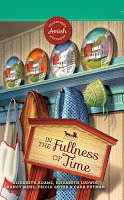 In The Fullness of Time
In The Fullness of TimeWith each passing season in their first year of married life, Cheryl and Levi Miller find a fresh set of challenges and adjustments to be made as the Englisher and her Amish farmer husband learn to live together. But by observing their friends and loved ones in the Sugarcreek community, the newlyweds see firsthand how God uses each new phase of life to reveal inspiring insights, spiritual truths, and future surprises...all while they harvest a whole new crop of mysteries as well!
 Elizabeth Ludwig is an accomplished speaker and teacher, often attending conferences where she lectures on crafting effective novel proposals and conducting successful editor/agent interviews. Her latest releases include Home Sweet Sugarcreek and A Tempting Taste of Mystery, part of the SUGARCREEK AMISH MYSTERIES series from Guideposts. Along with her husband, she makes her home in the great state of Texas. To learn more, visit ElizabethLudwig.com.
Elizabeth Ludwig is an accomplished speaker and teacher, often attending conferences where she lectures on crafting effective novel proposals and conducting successful editor/agent interviews. Her latest releases include Home Sweet Sugarcreek and A Tempting Taste of Mystery, part of the SUGARCREEK AMISH MYSTERIES series from Guideposts. Along with her husband, she makes her home in the great state of Texas. To learn more, visit ElizabethLudwig.com.

Published on August 30, 2017 02:00
August 29, 2017
Four Tips to Meet Deadlines
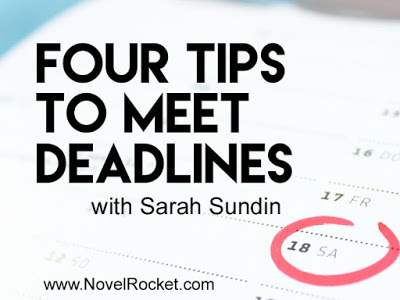 by Sarah Sundin, @sarahsundin
by Sarah Sundin, @sarahsundinAs a natural procrastinator, I struggle to meet deadlines. In college a late assignment only hurt myself. Not so in the publishing world. A late manuscript causes ripple effects in the publishing house from editing to marketing to sales, affecting our relationships and reputation—and our contracts! Even with smaller assignments, tardiness causes annoyance, inconvenience, and sometimes a loss of that opportunity.
Conversely, writers who meet deadlines gain respect, trust, and affection—and couldn’t we all use more of that?
Here are four keys to meet your deadlines and save your sanity.
1) Set Goals
Before I was published, my writers’ group encouraged us to write our monthly goals on an index card and keep it in sight. Since then, I’ve shifted to a goal chart. In this simple table, I enter all my assignments over the next few years, broken down by month.
The table has columns for types of projects—novel writing, publisher assignments (edits, title questionnaires, catalog copy), articles and interviews, and publicity (newsletter, website updates, speaking events, etc.).
Smaller projects get assigned to a month. Big projects, like novels, get broken into smaller monthly goals, such as a number of chapters or a word count goal. Leave room for “life”—like vacations, family events, and conferences.
2) Log Assignments
Author interviews, blog guest posts, and articles can overwhelm the writer. To keep track of the multiple details, I keep a spreadsheet, but a table works just as well.
I list each assignment chronologically by post date. I have columns for the website or blogger’s name, and the URL for the blog or website—after it posts, I change this to the permalink so I can visit and interact with commenters. The next four columns are for the date I receivedthe assignment, the due date, the date I sent it, and the post date. I note if I’m giving away a book and if I’ve mailed it. Then a column for notes.
3) File Assignments
We creative types don’t like stifling routines, but certain routines can save your hide. Whenever I receive a new assignment (book, interview, article, speaking event, endorsement request), I follow these steps.
Enter it in my goal chart. If applicable, enter it in my calendar, especially speaking events or book signings.
Enter interviews and articles in my spreadsheet.
Download or copy-and-paste interview questions or article guidelinesinto a Word document immediately. Give the document a functional name, like “Interview – blogger name – post date” or “Article – Novel Rocket – 8-29-17.” Save the creativity for your novel. You can also file the document in a folder.
File the email in a folder. My email folders include “Interviews and Articles,” “Speaking,” “Conferences,” “Endorsements,” and “Publisher.” When I finish an assignment, I can double-check the instructions in the emailand respond to the original message.4) Track Goals
The neatest calendars, charts, and spreadsheets don’t mean a thing without a tracking system. Get in the habit of making monthly, weekly, and daily checks.
On the first of each month, I analyze the previous month’s goal chart, highlighting completed projects. Leftoverassignments are scooted down to the next month. This helps me see developing problems and forces me to evaluate how much I can actually accomplish.
At the beginning of the week, I sit down with my goal chart and calendar, and I plan my week. At this stage I make sure I take care of the little assignments without falling behind on the big ones.
At the end of each day, I do a quick review and reassign any incomplete projects.
With a bit of time and effort, even the dreamiest novelist can become a professional!
TWEETABLES
Four Tips to Meet Deadlines by @sarahsundin on @NovelRocket #writing http://bit.ly/2vdpBhf (Click to Tweet)
From dreamy novelist to smart professional ~@sarahsundin on @NovelRocket #writing http://bit.ly/2vdpBhf (Click to Tweet)
Writers who meet deadlines gain respect, trust, and affection~ @sarahsundin on @NovelRocket #writing http://bit.ly/2vdpBhf (Click to Tweet)
____________________
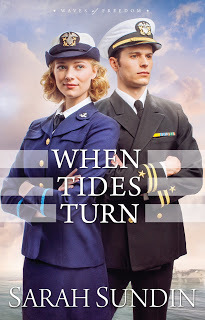 When Tides Turn
When Tides TurnWhen Quintessa Beaumont learns the US Navy has established the WAVES program for women, she enlists, eager to throw off her frivolous ways and contribute to the war effort. Lt. Dan Avery employs his skills in antisubmarine warfare to fight U-boats at the peak of the Battle of the Atlantic, but the last thing he wants to see on his radar is fun-loving Tess. As Dan and Tess work together in Boston, the changes in Tess challenge his notions—and his heart.
 Sarah Sundin is the author of nine historical novels, including When Tides Turn. Her novel Through Waters Deep was a finalist for the 2016 Carol Award, won the INSPY Award, and was named to Booklist’s “101 Best Romance Novels of the Last 10 Years.”A mother of three, Sarah lives in California. She enjoys speaking for church, community, and writers’ groups.Please visit her athttp://www.sarahsundin.com.
Sarah Sundin is the author of nine historical novels, including When Tides Turn. Her novel Through Waters Deep was a finalist for the 2016 Carol Award, won the INSPY Award, and was named to Booklist’s “101 Best Romance Novels of the Last 10 Years.”A mother of three, Sarah lives in California. She enjoys speaking for church, community, and writers’ groups.Please visit her athttp://www.sarahsundin.com.

Published on August 29, 2017 02:00
August 28, 2017
How to be a Courageous Author
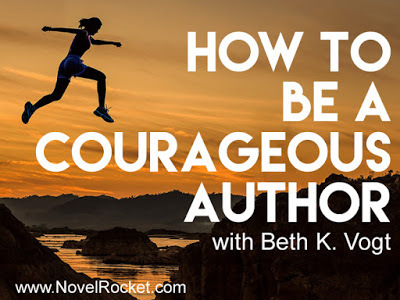 by Beth K. Vogt, @bethvogt
by Beth K. Vogt, @bethvogtIt appears that one of my favorite songs in The Sound of Music is the song actress Julie Andrews liked least of all.
The Sound of Music. What a story, with Julie Andrews as Maria, the spunky postulant – almost a nun – who falls in love with Captain von Trapp, the stern widower with seven children.
I love the scene where Maria sings “I Have Confidence,” as she strides down the street in those awful cast-off convent clothes, trying to convince herself that she’s not afraid of her future. If acting brave equals courage, Maria is one of the most daring woman you’ll ever meet, fictional or true to life.
Here’s what Julie Andrews said in an interview about “I Have Confidence”:
“The lyrics were a bit inane. Actually, what I did, because I couldn’t make sense of it and I have to have lyrics that make sense, I decided the best way to sing ‘I Have Confidence’ was to go completely nuts with panic and fear and busy work.”
The way Julie Andrews played Maria also teaches writers a valuable lesson. Take a closer look at courage and you discover that oh-so-brave person just might be faking it.
Don’t believe me? Well, maybe you’ll believe what some other, more notable people have said courage:
"Courage is resistance to fear, mastery of fear - not absence of fear. Except a creature be part coward it is not a compliment to say it is brave."~Mark Twain (1835-1910), American author & humoris
"Courage is being scared to death -- and saddling up anyway." ~John Wayne (1907-1979), American actor
"Courage is doing what you're afraid to do. There can be no courage unless you're scared." ~Edward Vernon Rickenbacker (1890-1973), American World War 1 fighter aceFor all our talk about having confidence as a writer, let’s give ourselves the freedom to admit that all confidence has a thread fear woven through it. We struggle against the belief that we can’t do the thing we want to do most. Write. Sign with an agent. Land a contract. Succeed at indie publishing.
But we start there – afraid. We don’t stay there.
Fear only rules the day – and our lives – if we focus on everything that could go wrong along the writing road: rejections, rewrites and all the waiting while others walk through open doors.
My challenge to you today? Choose to live the life of a courageous writer. Go ahead, admit that pursuing your dream is scary and go after your dream anyhow. Admit that you might hear a “No, thank you” from an editor or an agent – and go ahead and pitch your novel at the next conference you attend. Accept you may come back home without anyone asking for your proposal– and go ahead and polish that work-in-progress.
Do what you’re afraid to do.
It’s all part of courageously living your dream.
TWEETABLES
How to be a Courageous Author by @bethvogt on @NovelRocket #writing http://bit.ly/2vdgDAW (Click to Tweet)
Take a closer look at courage and you discover that brave person just might be faking it @bethvogt @NovelRocket http://bit.ly/2vdgDAW (Click to Tweet)
Admit that pursuing your dream is scary and go after your dream anyhow.~ @bethvogt on @NovelRocket #writing http://bit.ly/2vdgDAW (Click to Tweet)
____________________
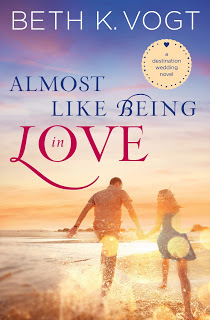 Almost Like Being in Love
Almost Like Being in Love
She’s won a luxurious dream wedding—now all she needs is the groom!
Winning an all-expenses paid Colorado destination wedding might seem like a dream come true for some people—but Caron Hollister and her boyfriend Alex Madison aren’t even engaged. How is she supposed to tell him that she’s won their wedding and honeymoon when he hasn’t asked her to marry him? And while everyone says they’re perfect for each other, how strong is a relationship when it’s built around protecting secrets?
Realtor Kade Webster’s business savvy just secured his company’s participation in the Springs Tour of Homes. He never imagined he would run into Caron Hollister—the woman who broke his heart—right when Webster Select Realty is taking off. When Kade learns his home stager won’t be able to help with the Tour of Homes, he vaults past all the reasons he should avoid Caron, and offers her a temporary job helping him on the project. This time, their relationship is purely business—Realtor to Realtor.
Spending time with Kade again has Caron questioning who she is and what she wants. The man intrigues her—at times infuriates her—and reminds her of what she walked away from. Has she been settling for what everyone expects of her? How can Caron say “I do” to one man when she’s wondering “what if?” about another?
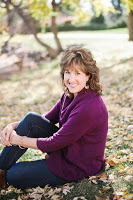 Beth K. Vogt is a non-fiction author and editor who said she’d never write fiction. She’s the wife of an Air Force family physician (now in solo practice) who said she’d never marry a doctor—or anyone in the military. She’s a mom of four who said she’d never have kids. Now Beth believes God’s best often waits behind the doors marked “Never.” Beth’s first women's fiction novel for Tyndale House Publishers, Things I Never Told You, releases May 2018. Beth is a 2016 Christy Award winner, a 2016 ACFW Carol Award winner, and a 2015 RITA® finalist. Her 2014 novel, Somebody Like You, was one of Publisher’s Weekly’s Best Books of 2014. A November Bride was part of the Year of Wedding Series by Zondervan. Having authored nine contemporary romance novels or novellas, Beth believes there’s more to happily-ever-after than the fairy tales tell us. An established magazine writer and former editor of the leadership magazine for MOPS International, Beth blogs for Novel Rocket and The Write Conversation and also enjoys speaking to writers group and mentoring other writers. She lives in Colorado with her husband Rob, who has adjusted to discussing the lives of imaginary people, and their youngest daughter, Christa, who loves to play volleyball and enjoys writing her own stories. Connect with Beth at bethvogt.com.
Beth K. Vogt is a non-fiction author and editor who said she’d never write fiction. She’s the wife of an Air Force family physician (now in solo practice) who said she’d never marry a doctor—or anyone in the military. She’s a mom of four who said she’d never have kids. Now Beth believes God’s best often waits behind the doors marked “Never.” Beth’s first women's fiction novel for Tyndale House Publishers, Things I Never Told You, releases May 2018. Beth is a 2016 Christy Award winner, a 2016 ACFW Carol Award winner, and a 2015 RITA® finalist. Her 2014 novel, Somebody Like You, was one of Publisher’s Weekly’s Best Books of 2014. A November Bride was part of the Year of Wedding Series by Zondervan. Having authored nine contemporary romance novels or novellas, Beth believes there’s more to happily-ever-after than the fairy tales tell us. An established magazine writer and former editor of the leadership magazine for MOPS International, Beth blogs for Novel Rocket and The Write Conversation and also enjoys speaking to writers group and mentoring other writers. She lives in Colorado with her husband Rob, who has adjusted to discussing the lives of imaginary people, and their youngest daughter, Christa, who loves to play volleyball and enjoys writing her own stories. Connect with Beth at bethvogt.com.

Published on August 28, 2017 11:49
August 27, 2017
Influence What?
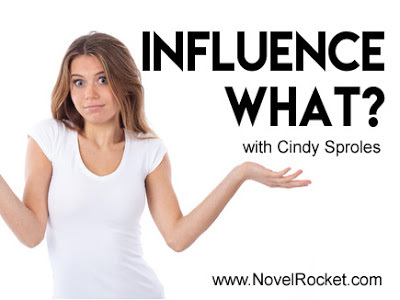 by Cindy Sproles, @CindyDevoted
by Cindy Sproles, @CindyDevotedDing. The computer chimes and you’ve got email.There’s a nice note asking if you will consider being an influencer. That’s nice. We all like the thoughts of influencing others, but in this case,a number of questions come to mind. Things like influence what? For whom? What’s in it for me?
Let’s take time to learn what an influencer is and then we’ll address what remains.
An influencer is someone chosen by an author or publishing house to help the author market their upcoming book. There is no financial gain or loss on this deal. You were chosen because, 1) the author trusts your judgment. 2) You have a solid platform with arms that reach deep into social media or specialty groups. 3) You love the author’s work and you’re one to pass along the news when you see a new book releasing. You’re a fan!
What’s it going to cost me? You aren’t required to buy ads, sell ads, nor will you be paid for the efforts you make. You were chosen in good faith and that, in and of itself, is an honor.
Now that we have that cleared up – what does an influencer do? It’s simple. You spread the word about the upcoming title. Tweet, peep, squeak, and squawk to all your friends and peers. If you have a local book retailer, let them know you have a great suggestion for their store and share that information. That’s it in a nutshell. You simply open your mouth and talk.
So, what are the perks? You get a free book. Once that book arrives integrity comes into play. It costs a great deal of money to print and mail out influencer copies. The author and the publisher are counting on you to help spread the news. Read the book quickly and start to share the information about the title, the cover, release date, and just how much you loved the book.
More and more authors are providing prepared tweets, written interviews for blogs, and making themselves available for Blogtalk radio shows and podcasts. All you must do is grab the information in the format you are most comfortable and run with it. INFLUENCE!
But all I got was a PDF! No, the author and publisher are not trying to knock you out of a free book, but readers are vastly enjoying reading on their Kindle, iPad, computer, or other devices. It’s a matter of convenience. They want you to read the book and share it. Handing it to you in a format you readily use, assures them you’ll uphold your end of the bargain.
Am I required to write a review? No. You aren’t required to do anything. You don’t even have to read the book, but if you don’t, it defeats the purpose of being an “influencer.” As Mark Twain once said, “Clothes make the man. Naked people have little or no influence on society.” In other words, if you don’t know your subject matter, you can’t guide others. Please, please, please be kind and write a review. Your review will encourage others to read. Post it on Amazon, Barnes & Noble, the publisher’s site, and Goodreads. Most review venues do not require huge entries, rather simple information on how you enjoyed or disliked the book, the features that drew you to it, and if you recommend it.One review can spur the purchase of a book, and book purchases help the title gain ground for the author.
As an influencer, you are asked to share the announcement of the book’s release. Adding a review is gravy on the biscuit. After all, you were provided the gift of a nice book. Consider helping the author with a review as well.
What if I don’t like the book? Well, that’s a bit of a quandary, so I suggest you defer to the old adage, “If you don’t have anything nice to say, then don’t say anything at all.” Authors nor publishers expect you to be dishonest.And we all know books are subjective. What you may not like, your best friend may love. Keep that in mind.
If you choose to write a review in a negative light, then be kind. Say something like, “This book wasn’t my cup of tea . . . or Though this wasn’t in my wheelhouse . . .” then find good qualities about the book. One can be both honest and kind. There’s no need to rip an author to shreds. That’s of no help to anyone and it makes you look – well, kinda crabby.
Am I allowed to share the book once I’m finished reading it? The books come to you as a thank you, a gift in return for your kindness to help the author market the work. There is no obligation to the recipient to keep the book. I have often donated my copies after reading to the local library with a note written on the inside book cover, “If you read this work, help an author and write a review on Amazon.com. Thank you for reading.”
Is there a difference in an influencer and a beta reader? Oh yes. A beta reader will often be used by small publishing houses to read a manuscript after editing is complete. They act as an extra set of eyes, catching small typos and little details that were missed in the process. Influencers help spread the word. Both are important jobs and if you elect to accept either, please be diligent and do what you have promised.
Accepting the job of an influencer is vital and important. Helping a book “grow legs” is a generous thing for you to assist with. The author and publisher appreciate all your efforts. There are millions of books on Amazon alone, so your job as an influencer, is to help raise that new title into the view of the readers. When a book becomes a success, you know that you personally had a hand in that success. Thank you from both the author and the publishers
TWEETABLES
Influence What? by @CindyDevoted on @NovelRocket #writing http://bit.ly/2xzj6C7(Click to Tweet)
Accepting the job of an influencer is vital and important.~ @CindyDevoted on @NovelRocket #writing http://bit.ly/2xzj6C7(Click to Tweet)
When a book becomes a success, you know that you helped~ @CindyDevoted on @NovelRocket #writing http://bit.ly/2xzj6C7(Click to Tweet)
____________________
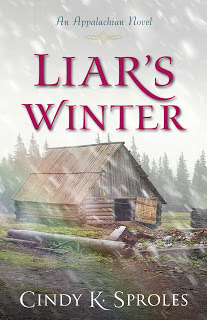 Liar's Winter
Liar's WinterLochiel Ogle was born with a red-wine birthmark—and it put her life in jeopardy from the moment she entered the world. Mountain folks called it "the mark of the devil," and for all the evil that has plagued her nineteen-year existence, Lochiel is ready to believe that is true. And the evil surely took control of the mind of the boy who stole her as an infant, bringing her home for his mother to raise.
Abused and abandoned by the only people she knows as family, Lochiel is rescued by a peddler and given the first glimpse of love she has ever known. The truth of her past is gradually revealed as is the fact that she is still hunted by a brother driven to see her dead. Unsure if there's anyone she can truly trust, Lochiel is faced with a series of choices: Will she continue to run for escape or will she face her past and accept the heartbreaking secrets it reveals? Which will truly free her?
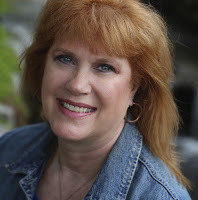 Cindy K. Sproles is the cofounder of Christian Devotions Ministries, a best-selling author, and a speaker. She teaches nationally at writers conferences as well as mentoring new writers. Cindy serves as the managing editor of SonRise Devotionals and Straight Street Books, both imprints of Lighthouse Publishing of the Carolinas. She is a contributing writer to The Write Conversation and Novel Rocket.com. You can visit Cindy at www.cindysproles.com.
Cindy K. Sproles is the cofounder of Christian Devotions Ministries, a best-selling author, and a speaker. She teaches nationally at writers conferences as well as mentoring new writers. Cindy serves as the managing editor of SonRise Devotionals and Straight Street Books, both imprints of Lighthouse Publishing of the Carolinas. She is a contributing writer to The Write Conversation and Novel Rocket.com. You can visit Cindy at www.cindysproles.com.

Published on August 27, 2017 02:00
August 26, 2017
Color Your Writing with Emotion
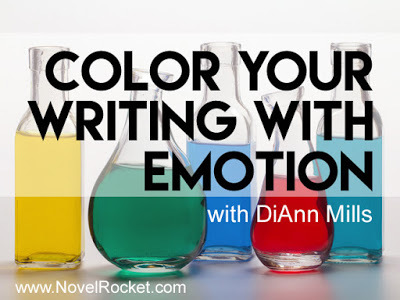 by DiAnn Mills, @diannmills
by DiAnn Mills, @diannmillsWriters are always looking for ways to deepen their writing. That’s who we are and what we do.
We explore the psychology of our characters to add tension and conflict to our projects.
We twist our plots and add dimension to narrative and setting.
When writers use color to establish emotion, the reader is able to experience the actions and reactions on a higher level. Emotions become vivid, and symbolism weaves into the storyline.
Writers, take a look at the following colors and explanations then think about your current writing and how to make your projects more meaningful.
Red is a warm color that causes strong emotions. From warm and comforting to anger and hostility. Red can stimulate the appetite. Now think about your favorite restaurant. Think about these phrases: redneck, red-hot, red-handed, paint the town red or seeing red.
Blue carries a range of emotions from calmness to serenity. Many offices are painted blue because people are more productive in blue rooms. Blue can also mean sadness. Anyone enjoy the blues and a weeping saxophone? Blue Monday? Blue ribbon day. A recent magazine article stated that blue helps a dieter keep her weight in check.
Green symbolizes nature and growth. The color has a calming affect. It’s been proven that those who work in an office painted green have fewer stomach aches. It also can mean wealth, greed, and jealousy. In the 15th century, green represented fertility and wedding dresses were green. Think about that the next time you select a green M&M. What emotions do these spark in you? Green with envy. Greenhorn. A green thumb?
Yellow is often described as cheery and warm. It can also be a color of frustration. More tempers are lost in yellow rooms, and babies tend to cry more in yellow rooms. This is another color that can stimulate the appetite. But what about the coward who’s referred to as yellow? Or a yellow traffic light?
Purple is often associated with royalty, wealth, wisdom, and spirituality. Sometimes it symbolizes arrogance. Remember the book and movie, The Color Purple? The Purple Heart?
Brown is a natural color that invokes a down to earth feeling. However for a person who is isolated on a farm and feels imprisoned, the color brown may be depressing.
Pink is a romance color. It suggests love, femininity, calmness. Some consider it soothing. Are you in the pink? “The very pink of perfection.”
Orange mixes red and yellow to create a warm affect. It means excitement and enthusiasm. Orange is also associated with autumn, the end of the growing season and the entrance into winter.
White signifies purity and innocence. It can also mean spaciousness or a sterile environment. Remember the fairy tale Snow White?
Black means evil, power, death, or mourning. In the fashion world, it’s used to create a slimming affect, even sophistication. Consider these phrases: Black Death, blackout, black cat, black list, black market, black tie, black belt.
Gray is a mix of black and white, death and life. Gray clouds. Gray moods. What about a gray sea where fishermen brave the seas to provide for their families, but a twist of the weather can mean death?
Understanding color can add emotion and symbolism to your creative process. How can you apply color to your writing?
TWEETABLES
Color Your Writing with Emotion by @diannmills on @NovelRocket #writing http://bit.ly/2w4Q6V7 (Click to Tweet)
Experience the actions and reactions on a higher level~ @diannmills on @NovelRocket #writing http://bit.ly/2w4Q6V7 (Click to Tweet)
Add emotion and symbolism to your creative process~ @diannmills on @NovelRocket #writing http://bit.ly/2w4Q6V7 (Click to Tweet)
_____________________
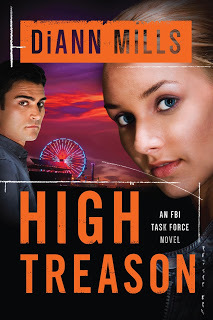 High Treason
High TreasonWhen Saudi Prince Omar bin Talal visits Houston to seek cancer treatment for his mother, an attempt on his life puts all agencies on high alert. FBI Special Agent Kord Davidson is the lead on the prince’s protective detail because of their long-standing friendship, but he’s surprised – and none too happy – when the CIA brings one of their operatives, Monica Alden, in on the task force after the assassination attempt.
Kord and Monica must quickly put aside inter-agency squabbles, however, when they learn the prince has additional motives for his visit – plans to promote stronger ties with the US and encourage economic growth and westernization in his own country. Plans that could easily incite a number of suspects both in the US and in countries hostile to Saudi Arabia. Worse yet, the would-be assassin always seems to be one step ahead of them, implicating someone close to the prince – or the investigation. But who would be willing to commit high treason, and can Kord and Monica stop them in time?
 DiAnn Mills is an award winning writer who believes her readers should expect an adventure. She currently has more than fifty-five books published. Her titles have appeared on the CBA and ECPA bestseller lists and have won placements through the American Christian Fiction Writer’s Carol Awards and Inspirational Reader’s Choice awards. DiAnn won the Christy Award in 2010 and 2011. DiAnn is a founding board member for American Christian Fiction Writers and a member of Inspirational Writers Alive, Romance Writers of America, and Advanced Writers and Speakers Association. She speaks to various groups and teaches writing workshops around the country. DiAnn is also a Craftsman mentor for the Jerry B. Jenkins Christian Writers Guild. She and her husband live in sunny Houston, Texas. Find her on the web at www.diannmills.com.
DiAnn Mills is an award winning writer who believes her readers should expect an adventure. She currently has more than fifty-five books published. Her titles have appeared on the CBA and ECPA bestseller lists and have won placements through the American Christian Fiction Writer’s Carol Awards and Inspirational Reader’s Choice awards. DiAnn won the Christy Award in 2010 and 2011. DiAnn is a founding board member for American Christian Fiction Writers and a member of Inspirational Writers Alive, Romance Writers of America, and Advanced Writers and Speakers Association. She speaks to various groups and teaches writing workshops around the country. DiAnn is also a Craftsman mentor for the Jerry B. Jenkins Christian Writers Guild. She and her husband live in sunny Houston, Texas. Find her on the web at www.diannmills.com.

Published on August 26, 2017 02:00
August 25, 2017
The Next Generation of “Critique” Partnerships
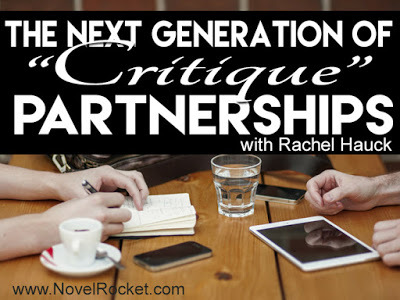 by Rachel Hauck, @RachelHauck
by Rachel Hauck, @RachelHauck I’m starting a campaign. Time for a “second wave” critique partnership model.
“Rachel, what do you mean? I love my critique partners.”
I know! Keeping loving them. Love them well! There’s nothing like a solid critique/writing partner.
The person who faithfully answers frantic phone calls or emails. “Help! I have no idea what I’m doing.”
So here’s what I mean by “second wave” critique partner: adding craft as the key component of your partnership.
It’s a marriage of brainstorming, crafting and critiquing.
What’s the benefit? Having a clearer goal for your scenes and chapters before you write them.
For the most part, a critique partner reads what you’ve already written. A craft partner helps you before you write. And yes, while you write.
My craft partner, Susan Warren, often calls me scene by scene. “This is what I just wrote, now help me decide where I’m going next.”
Because we speak the same craft and story structure language, and because we’ve crafted our stories together from the beginning, we know the journey our characters are meant to take.
Susie’s saved me on more than one occasion.
“I think I need a terrorist attack in my prince book.”
“No! You can’t have a terrorist attack in your prince book.”
She was right and saved me valuable writing time. Because we speak the same craft language, she asked, “What are you hoping to accomplish with a terrorist attack?”
When I told her I needed to raise the stakes for my prince, she helped me figure out a new stake based on what I’d already written. The conversation was invaluable.
A craft partnership enables you to have one or two, maybe three, people as familiar with your story as you.
When you’re stuck or foggy-headed because that ole deadline is approaching, or because you’re still learning the ins and outs of novel writing, a craft partner(s) reminds you of what your story is about and where you wanted to go.
The beauty is this method works well for plotters and pantsers!
A craft partner looks at over all structure and character development, and helps develop what Stanley Williams calls the story “spine.”
What’s this story about?
What does the protagonist want?
What is the noble quest or the story journey?
What will the protagonist do in the end he/she can’t do in the beginning?
What’s the inciting incident?
What happens in the middle of the book?
What’s the moment of truth for this protagonist?
What’s their identity verses essence?
What’s a possible black moment?
What is the possible epiphany?
See where I’m going?
A craft partner as like an architect, creating a blueprint before the work begins.
It’s a skeletal outline of where you want to go, your heart and goal for the story.
However, there’s still plenty of beauty in the story to be discovered along the way.
Here’s some suggestions on a craft partnership works:
Join up with one or two writers you get a long with well. You don’t have to be in the same genre. You don’t have to be in the same publishing place. Indie authors can pair with traditionally published authors. Just find that kindred spirit.
Work from the same play book. Pick a craft philosophy and study it. Use it’s terminology as a foundation for hammering out your stories. Develop your own terminology if you want but know the basics of how to structure a book.
When one of you starts a book, use those craft tools to help develop the story. Get the building blocks into place before you start writing. Know where the story is going. This works well for plotters and pantsers.
When you get stuck in the thick-of-the-middle, you can call on your craft partner to help keep you on track. Even remind you of story elements you’ve forgotten. Or keep you from veering too far off course.
If you want to change your story, a craft partner can help navigate those changes. I’ve had to convince my writing partner the change was necessary. As a result, I further understood the story myself.
So take the challenge. Join the next wave of critiquing and start crafting!
TWEETABLES
The Next Generation of “Critique” Partnerships by Rachel Hauck (Click to Tweet)
It’s a marriage of brainstorming, crafting and critiquing.~ Rachel Hauck (Click to Tweet)
5 suggestions on how to make a craft partnership work.~ Rachel Hauck (Click to Tweet)
__________
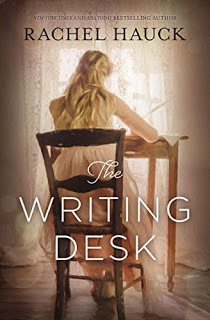 THE WRITING DESK
THE WRITING DESKTenley Roth’s first book was a runaway bestseller. Now that her second book is due, she’s locked in fear. Can she repeat her earlier success or is she a fraud who has run out of inspiration?
With pressure mounting from her publisher, Tenley is weighted with writer’s block. But when her estranged mother calls asking Tenley to help her through chemotherapy, she packs up for Florida where she meets handsome furniture designer Jonas Sullivan and discovers the story her heart’s been missing.
A century earlier, another woman wrote at the same desk with hopes and fears of her own. Born during the Gilded Age, Birdie Shehorn is the daughter of the old money Knickerbockers. Under the strict control of her mother, her every move is decided ahead of time, even whom she’ll marry. But Birdie has dreams she doesn’t know how to realize. She wants to tell stories, write novels, make an impact on the world. When she discovers her mother has taken extreme measures to manipulate her future, she must choose between submission and security or forging a brand new way all on her own.
Tenley and Birdie are from two very different worlds, but fate has bound them together in a way time cannot erase.
 New York Times, USA Today and Wall Street Journal best-selling, award-winning author Rachel Hauck loves a great story. She serves on the Executive Board for American Christian Fiction Writers. She is a past ACFW mentor of the year. A worship leader and Buckeye football fan, Rachel lives in Florida with her husband and ornery cat, Hepzibah. Read more about Rachel at www.rachelhauck.com.
New York Times, USA Today and Wall Street Journal best-selling, award-winning author Rachel Hauck loves a great story. She serves on the Executive Board for American Christian Fiction Writers. She is a past ACFW mentor of the year. A worship leader and Buckeye football fan, Rachel lives in Florida with her husband and ornery cat, Hepzibah. Read more about Rachel at www.rachelhauck.com.

Published on August 25, 2017 02:00
August 24, 2017
Love IS the Answer
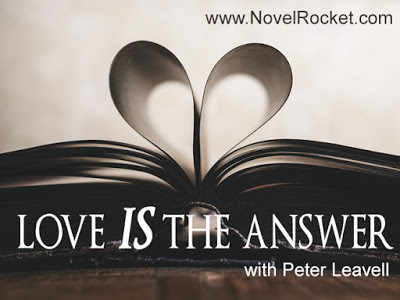 by Peter Leavell, @PeterLeavell
by Peter Leavell, @PeterLeavell God, are You good? Are You everywhere and know all things?
Yes? Then why does evil exist? (Theodicy)
Evil: Harm. Injury. And the decision to cause harm and injury. Enter the villain.
What overcomes evil? Gumption? Bacon? A can-do attitude? All good thing—maybe even great—but that’s not the Biblical, or even the philosophical answer.
Love: A feeling of constant affection for a person. The great commandment and the golden rule. Enter the hero.
Theologian pumps fist in the air. “Yes! Free will to love God keeps Him from destroying evil at this time, allowing us to choose the greater. Or the worse. But choice is indicative in the definition of love.”
Thank you. May I have the mic back, please.
Christian fiction tests the Bible’s claim that love is the antithesis of evil. A tall order, especially when the ability to examine evil is limited by the need to keep the literature relatively clean. That aside, love/compassion compels the hero in our novels to right the wrongs, no matter how evil they are.
Natural evil: Natural disasters, like hurricanes, fires, and bacon shortages.A villain’s randomness without intent.
Moral evil: Genocide. Murder. Pain. Emotional abuse. Villains at their worst. The stories are endless.
The worse the evil, the more amazing the hero.
The hero’s journey of self-discovery is a series of choices that reflect God’s goodness despite the evil in this world. Is the hero’s love strong enough to act? Or is the hero’s fear, self-preservation, or selfish desires, too strong and evil wins?
The movie Dunkirk had only a few choice words, but a son’s journey of self-discovery and love left me stunned. Darth Vader’s act of love overcame evil. The Brothers Karamazov is the philosophical journey of rejecting God because of evil. The Great Gatsby is a hunger for love, but everyone is too immature to give, or even receive it. A Wrinkle in Time blatantly researches this theme.
God, are you good? Are you omnipotent and omnipresent?
Why does evil exist?
Explore the theme in your work!
TWEETABLESLove IS the Answer by Peter Leavell (Click to Tweet)
Love/compassion compels the hero in our novels to right the wrongs.~ Peter Leavell (Click to Tweet)
The worse the evil, the more amazing the hero.~ Peter Leavell (Click to Tweet)
---------------------
Shadow of Devil's Tower
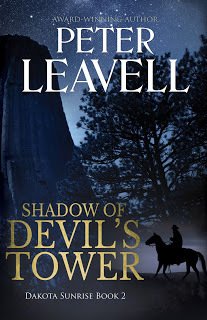
Philip Anderson is a reluctant gunslinger whose fame has spread through the Dakota Territory. He can't escape his reputation as the hero who took down the entire Maxwell Gang, and he's even had a popular dime novel written about him. All Philip yearns for is to live a quiet life raising horses and to finally marry his beloved Anna. He'd gladly give up his half of the treasure map his murdered father left behind, but until Jacob Wilkes is captured he can never hang up his gun. Bent on destroying Philip and everything he loves, Wilkes has his eye on the hidden cache. And on Anna.
Just when Philip thinks he might be able to bury the demons of his past, the unthinkable happens and Anna and her family are kidnapped. Riding his Arabian mare Raven, he is forced into the race of his life as he desperately tracks his enemies across the desert. Can he rescue Anna before it's too late? Joining forces with old friends like Teddy Roosevelt and Running Deer, Philip is pushed to the breaking point. Will he ever be free, or must he make the ultimate sacrifice for those he loves under the shadow of Devil's Tower?
 Peter Leavell, a 2007 graduate of Boise State University with a degree in history, was the 2011 winner of Christian Writers Guild's Operation First Novel contest, and 2013 Christian Retailing's Best award for First-Time Author. Peter and his family live in Boise, Idaho. For entertainment, he reads historical books, where he finds ideas for new novels. Whenever he has a chance, he takes his wife and two homeschooled children on crazy but fun research trips. Learn more about Peter's books, research, and family adventures at www.peterleavell.com
Peter Leavell, a 2007 graduate of Boise State University with a degree in history, was the 2011 winner of Christian Writers Guild's Operation First Novel contest, and 2013 Christian Retailing's Best award for First-Time Author. Peter and his family live in Boise, Idaho. For entertainment, he reads historical books, where he finds ideas for new novels. Whenever he has a chance, he takes his wife and two homeschooled children on crazy but fun research trips. Learn more about Peter's books, research, and family adventures at www.peterleavell.com

Published on August 24, 2017 02:00
August 23, 2017
INADEQUACY
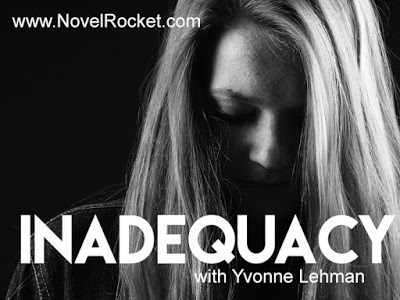 by Yvonne Lehman, @YvonneLehman
by Yvonne Lehman, @YvonneLehmanDuring morning devotion time, I flipped through a few pages of my favorite devotional, Magnificent Prayer, to look at underlined statements. My eyes stopped on a passage and I read, “To pray is to tell Jesus what we lack.”
My thoughts immediately went to an experience the day before during a verbal exchange. So upon reading the “what I lack” statement, I said, “I sometimes lack ability to make myself clear in conversation, or in relaying what I mean in a concise way.”
Then I added, “Jesus, I even feel inadequate when talking to You.”
He instantly confirmed in my spirit, “You are inadequate. That’s why you need to talk to me.”
Well, duh! I had a fit of laughter. How simply true.
When feeling that I’m inadequate to express myself well in talking to Jesus, I shouldn’t quit.
We learn by doing.
I need to keep on talking.
Practice!
As happens in about every experience in my life, my thoughts went to how that might apply to writing.
Many writers I’ve encountered in over-forty years of being in this profession express their feeling of inadequacy. At conferences, the greatest fear seems to be of talking with an editor, agent, or critiquer. The feeling of inadequacy comes to the forefront.
If I’m about to give a critique, and I pause and simply look at the writer, they will invariably say, “It’s not any good, is it?”
I don’t know how to pitch.
What’s a one-sheet?
How can I tell 95,000 words in 10 minutes?
So many, especially beginning writers, talk about feeling so inadequate. Are their words coherent, worthy, meaningful, expressed in a clear, concise way?
How to alleviate the feeling of inadequacy?
Keep talking
Keep praying
Keep practicing
Keep learning
Keep writing
… until we gain experience, and become confident in our adequacy.
We can take the instruction the apostle Paul gave to the younger Timothy, “Work hard so God can approve you. Be a good worker, one who does not need to be ashamed and who correctly explains the word of truth (2 Timothy 2:15 NLT).
When we experience the attitude of, “Your writing’s not good enough. It’s inadequate.”
Say, “Thank you.”
Don’t quit.
Learn more.
Keep practicing.
Never quit talking to Jesus.
Never quit practicing writing.
And, there’s always room for improvement, to become more adequate, so blessedly, the writing journey is never over.
With time, effort, and practice we can begin to have a feeling of adequacy enough to be confident in continuing to talk to Jesus, and practicing our writing.
That way, we receive His abundant blessings and, with our words, pass it on to others.
TWEETABLES
INADEQUACY by Yvonne Lehman (Click to Tweet)
We learn by doing.~ Yvonne Lehman (Click to Tweet)
Keep talking; Keep praying; Keep practicing; Keep learning; Keep writing!~ Yvonne Lehman (Click to Tweet)
____________
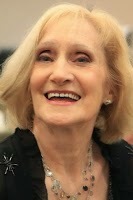 Yvonne Lehman is an award-winning, best-selling author of more than 3,000,000 books in print, who founded and directed the Blue Ridge Mountains Christian Writers Conference for 25 years, is now director of the Blue Ridge “Autumn in the Mountains” Novelist Retreat. She earned a Master’s Degree in English from Western Carolina University and has taught English and Creative Writing on the college level. Her latest releases include Have Dress Will Marry (Heart of a Cowboy collection, Mountainbrook Ink), Better Latte Than Never (Winged Publications), Stupid Moments and Additional Christmas Moments in the non-fiction Divine Moments series (Grace Publishing). Her popular 50th novel is Hearts that Survive – A Novel of the TITANIC, which she signs periodically at the Titanic Museum in Pigeon Forge TN.
Yvonne Lehman is an award-winning, best-selling author of more than 3,000,000 books in print, who founded and directed the Blue Ridge Mountains Christian Writers Conference for 25 years, is now director of the Blue Ridge “Autumn in the Mountains” Novelist Retreat. She earned a Master’s Degree in English from Western Carolina University and has taught English and Creative Writing on the college level. Her latest releases include Have Dress Will Marry (Heart of a Cowboy collection, Mountainbrook Ink), Better Latte Than Never (Winged Publications), Stupid Moments and Additional Christmas Moments in the non-fiction Divine Moments series (Grace Publishing). Her popular 50th novel is Hearts that Survive – A Novel of the TITANIC, which she signs periodically at the Titanic Museum in Pigeon Forge TN.

Published on August 23, 2017 02:00
August 22, 2017
Need More Writing Time? Learn to delegate
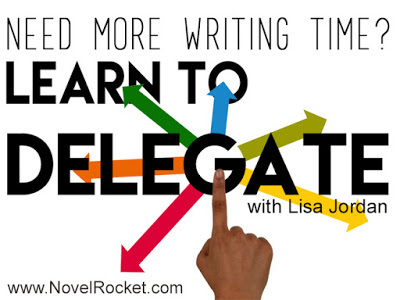 by Lisa Jordan, @lisajordan
by Lisa Jordan, @lisajordan The summer after I graduated high school, I worked as a waitress at a local family 24-hour restaurant.
During a particularly busy rush after the bars closed at 2 a.m., I maneuvered through a crowded dining room, carrying a large oval tray above my head loaded with hot food. I approached the customers’ table and started serving their meals.
A rowdy gentleman, who had consumed large quantities of alcohol, pushed his chair out, slamming it into my back. My knees buckled, but I struggled to keep from face planting in someone’s mashed potatoes while holding onto the heavy tray with the rest of the food.
Unfortunately, the balance had shifted on the tray. To my horror, a side order of beef gravy slid and spilled down the back of the gentleman’s leather coat hanging on his chair.
Even though he was at fault, I apologized profusely, but his inebriated state created chaos and added to my humiliation in the dining room. He demanded to speak with my manager and insisted I be fired on the spot.
Fortunately, several customers came to my defense. The manager calmed everyone down, comped the man’s meal, offered to pay for his jacket to be cleaned, then asked him to leave when he grew more irate because I wasn’t being fired.
Life has a way of creating a chain reaction. When we carry many responsibilities, we struggle to maintain balance, especially if we neglect to ask for help. Trying to do everything becomes exhausting. Not only that, but resentment can build up when we see others enjoying themselves while we’re slaving away in the kitchen, folding laundry or putting the finishing touches on the costume that’s due tomorrow…and you learned about it yesterday.
Yes, some of us may be control freaks—we like knowing things are done the way we want and we don’t have to wait on others. But you know what? We can’t do it all. Besides we risk depriving others the blessing of helping.
So before you drop your tray of responsibilities, take the first step and ask for help.
Consider the ages and abilities of your family members. Think about everything on your daily to-do list.
Teach your kids how to do their own laundry. Sure they may grumble and their whites may end up pink or blue, but you’re teaching them responsibility and offering them self-help skills.
Ask your teenagers to take over cooking one night a week. They may find they enjoy it. When my boys were in high school, they had to cook one night a week. My oldest son enjoyed it so much he went to culinary school after high school.
Make a grocery list and ask Hubby to stop to pick up a few things after work.
If you have teens that drive, ask them to act as the ballet or soccer chauffer. Or consider exchanging carpool duties with another parent so you’re not running every night. Swapping helps out both of you.
Teach your younger children how to pick up the living room and put things where they belong. Make a game of it by setting a kitchen timer for 15 minutes and see if they can beat the timer. By delegating simple tasks, you’re teaching your children how to be independent. Plus they will see how they’re blessing you by giving you more time to pursue your writing. That shows them the value of working hard to achieve your dream.
TWEETABLES
Need More Writing Time? Learn to delegate by Lisa Jordan (Click to Tweet)
Delegating teaches your family responsibility and frees up writing time for you.~ Lisa Jordan (Click to Tweet)
Show your kids the value of working hard to achieve your dream.~ Lisa Jordan (Click to Tweet)
--------------------
Lakeside Romance

A Recipe for Romance
Sarah Sullivan will do whatever it takes to make her summer youth program permanent. But when she's tasked to teach the teens basic kitchen skills, her hope goes up in flames. Not knowing the first thing about cooking, Sarah needs help. Smelling the delicious aromas coming from her neighbor's apartment one night, she thinks she's found her answer. Alec Seaver might know his way around pots and pans, but the lone-wolf widower doesn't want anything to do with the free-spirited beauty next door. But after he becomes Sarah's reluctant partner, Alec realizes that she might just be the key ingredient missing from his life.
 Heart, home, and faith have always been important to Lisa Jordan, so writing stories with those elements come naturally. Represented by Rachelle Gardner, Lisa is an award-winning author for Love Inspired, writing contemporary Christian romances that promise hope and happily ever after. She is the Operations Manager for Novel.Academy, powered by My Book Therapy. Happily married to her own real-life hero for almost thirty years, Lisa and her husband have two grown sons. When she isn't writing, Lisa enjoys family time, kayaking, good books, and playing in her craft room with friends. Visit her at lisajordanbooks.com.
Heart, home, and faith have always been important to Lisa Jordan, so writing stories with those elements come naturally. Represented by Rachelle Gardner, Lisa is an award-winning author for Love Inspired, writing contemporary Christian romances that promise hope and happily ever after. She is the Operations Manager for Novel.Academy, powered by My Book Therapy. Happily married to her own real-life hero for almost thirty years, Lisa and her husband have two grown sons. When she isn't writing, Lisa enjoys family time, kayaking, good books, and playing in her craft room with friends. Visit her at lisajordanbooks.com.

Published on August 22, 2017 02:00
August 21, 2017
God’s Waiting Room
 by Pamela S. Meyers, @pamelameyers
by Pamela S. Meyers, @pamelameyers Earlier this week, I started working on my next article for Novel Rocket and now I can’t find it. In my search, I came upon a post I’d written back in 2010, the year before I was offered my first book contract. Oh so much water has flowed under that proverbial bridge since then. But, one thing I learned in the process is that if you want to write for publication, be prepared to wait. Even after you are published.
The article I wrote back in 2010 is till as timely today as it was back then, because in publishing some things never change. Here is the article:
*** Last August on a very hot and humid day, a friend and I stepped into a very crowded ophthalmologist’s waiting room. Since most everyone who sees the doctor has to have eye drops, they need a designated driver, which means two seats for every patient.
Because of an emergency trip to Haiti to assist earthquake victims a couple of weeks earlier, the doctor had to cancel a lot of appointments. As a result, on the day of my appointment, they'd doubled up on appointments to catch up. A "catch-22" in the making.
That waiting situation did have a conclusion, but another waiting room I’m in is far different. I call it God’s Waiting Room. I’ve been in His waiting room far longer than that day at the eye doctor, but unlike the stuffy doctor's office, His waiting room is exciting because I have learned that God doesn't waste time even while we are waiting.
This past year, He revealed to me that those internal nudges I sometimes feel are more than just intuition, but the Holy Spirit Himself guiding me to make good choices. Of course I've believed, ever since surrendering to Christ, that the Holy Spirit is within me, but this took my concept of that to a whole new level.
Now, I begin every morning acknowledging that God is my Creator and He is the one on whom I depend for the very air that I breathe and for everything in my life. He is the one who equipped me with the desire and talent to write, and in His due time I will reap a harvest. That without Jesus going to the cross for me, I wouldn't even be able to stand before God and pray to Him and know that He hears me and loves me unconditionally.
While I wait, I continue to do what He has called me to do—write, and learn to write better. I attend conferences, listen to teaching on MP3's, participate in on-line courses, and read a lot of fiction. Reading is for enjoyment and entertaining, but for a writer like me, it's also learning by the example of authors who have gone before me.
I ended my last blog about God's waiting room by saying I wouldn't want to be anywhere else. I still feel the same way.
***
I love it when I find something I wrote years ago is still so true today.
There is a verse in Ecclesiastes that says He makes all things beautiful in His time. He did make it beautiful for me a year later when I received two book contracts within a couple months of each other. If you are waiting for your next big break, or maybe for your first big break, do this: Take stock, be proactive as possible, learn more about the craft by attending conferences and workshops, take online courses, and above all else…write! Last, but not least, pray and release it to God.
How have you seen God work in your writing life when you thought the waiting would never end?
TWEETABLES
God’s Waiting Room by Pamela S. Meyers (Click to Tweet)
If you want to write for publication, be prepared to wait.~ Pamela S. Meyers (Click to Tweet)
God's waiting room. An exciting place to be.~ Pamela S. Meyers (Click to Tweet)
----------
Second Chance Love
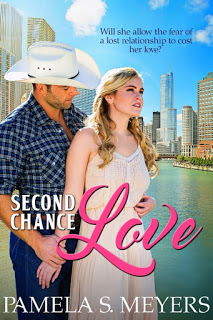 Chicago lawyer Sydney Knight and Texas bull rider Jace McGowan have nothing in common but everything to lose when they are thrust together during a weekend rodeo in rural Illinois. Sydney is determined she’ll get Jace out of his contract and return to Chicago with her heart intact, but Jace is just as determined to help her see they are meant to be together. Can a city girl with roots deep in Chicago and a bull-riding rancher with roots deep in Texas give themselves a second-chance love?
Chicago lawyer Sydney Knight and Texas bull rider Jace McGowan have nothing in common but everything to lose when they are thrust together during a weekend rodeo in rural Illinois. Sydney is determined she’ll get Jace out of his contract and return to Chicago with her heart intact, but Jace is just as determined to help her see they are meant to be together. Can a city girl with roots deep in Chicago and a bull-riding rancher with roots deep in Texas give themselves a second-chance love? Pamela S. Meyers lives in northern Illinois with her two rescue cats. Her novels include Thyme for Love, Love Finds You in Lake Geneva, Wisconsin, Second Chance Love, and Surprised by Love in Lake Geneva, Wisconsin (a reissue of Love Finds You in Lake Geneva). Her novellas include:What Lies Ahead, in The Bucket List Dare collection, and If These Walls Could Talk, in Coming Home:A Tiny House Collection.When she isn’t at her laptop writing her latest novel, she can often be found nosing around Midwestern spots for new story ideas.
Pamela S. Meyers lives in northern Illinois with her two rescue cats. Her novels include Thyme for Love, Love Finds You in Lake Geneva, Wisconsin, Second Chance Love, and Surprised by Love in Lake Geneva, Wisconsin (a reissue of Love Finds You in Lake Geneva). Her novellas include:What Lies Ahead, in The Bucket List Dare collection, and If These Walls Could Talk, in Coming Home:A Tiny House Collection.When she isn’t at her laptop writing her latest novel, she can often be found nosing around Midwestern spots for new story ideas.

Published on August 21, 2017 08:41



